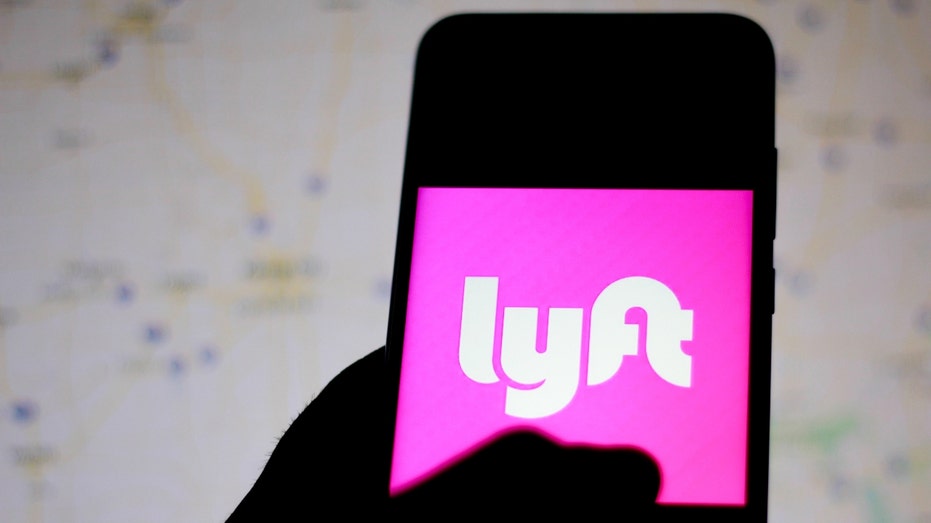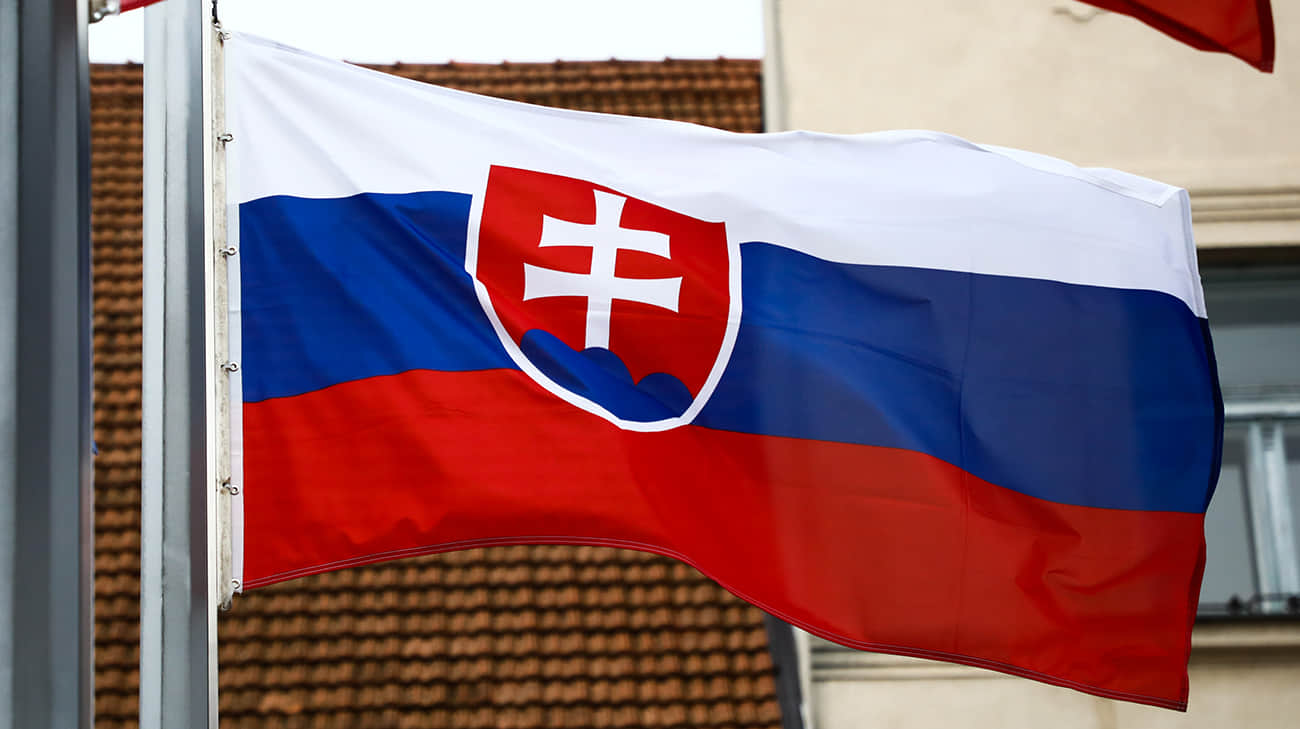“Our children are gone”: Russian missile strike kills every sixth resident in village
The Ukrainian village of Hroza, where a deadly café strike orphaned children and killed residents, rebuilds shattered lives in the wake of tragedy The post “Our children are gone”: Russian missile strike kills every sixth resident in village appeared first on Euromaidan Press.
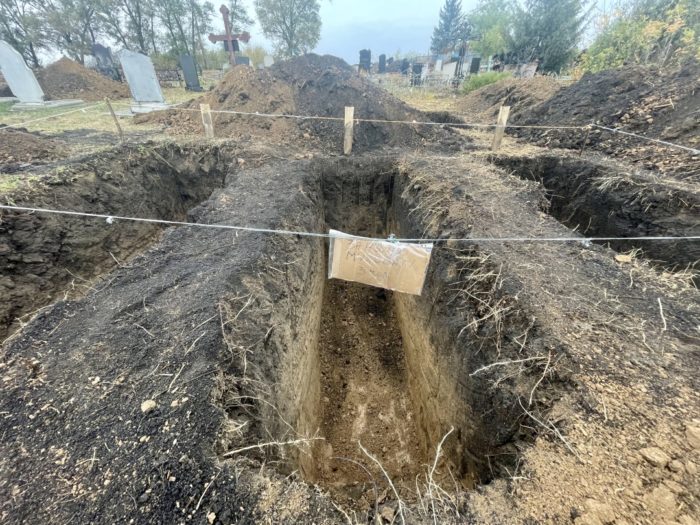
Article by Mariia Avdieieva and Artem Lysak
Decoding Ukraine brings a special report from Hroza.
The missile strike on the village of Hroza became one of the bloodiest during the Russian invasion. The village, which survived seven months of occupation, shuddered with the scale of grief that came to almost every family. Every sixth resident of Hroza was killed during the strike by the Russian Iskander missile at the cafe, where people gathered after the reburial of Andriy Kozyr, who died in the first months of the war. How is Hroza recovering after what it experienced? Read and watch in the new special project Decoding Ukraine.
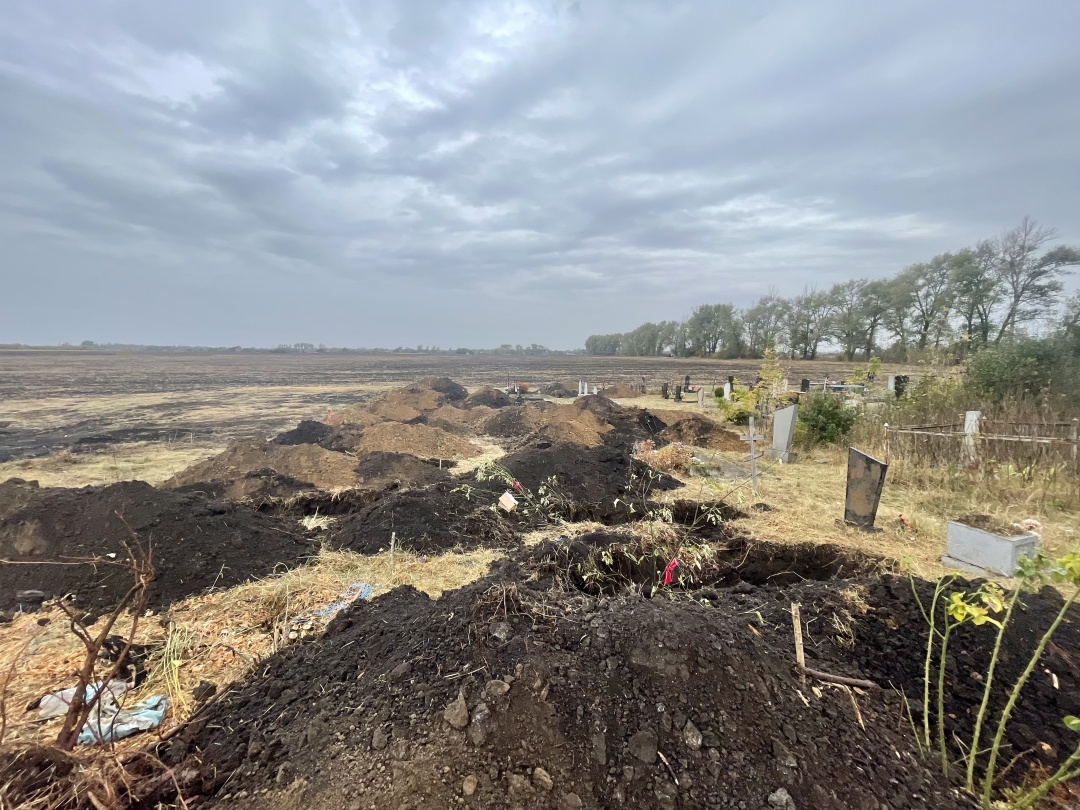
Heavy raindrops fall on the freshly dug earth in the Hroza cemetery, wiping away the handwritten notes on cardboard plates: “Panteleiev family, 4 people,” “Occupied, Mukhovati, 3 people,” “Hrib, Kozyr, Chehodaieva, 7 people” or just “Occupied.” The first funeral of those killed by the Russian missile strike was scheduled for 3:00 pm on Saturday, 8 October, but there was some delay at the morgue in Kharkiv, and relatives and friends of Tetiana and Mykola Androsovych are waiting for their bodies to be brought by the funeral car.
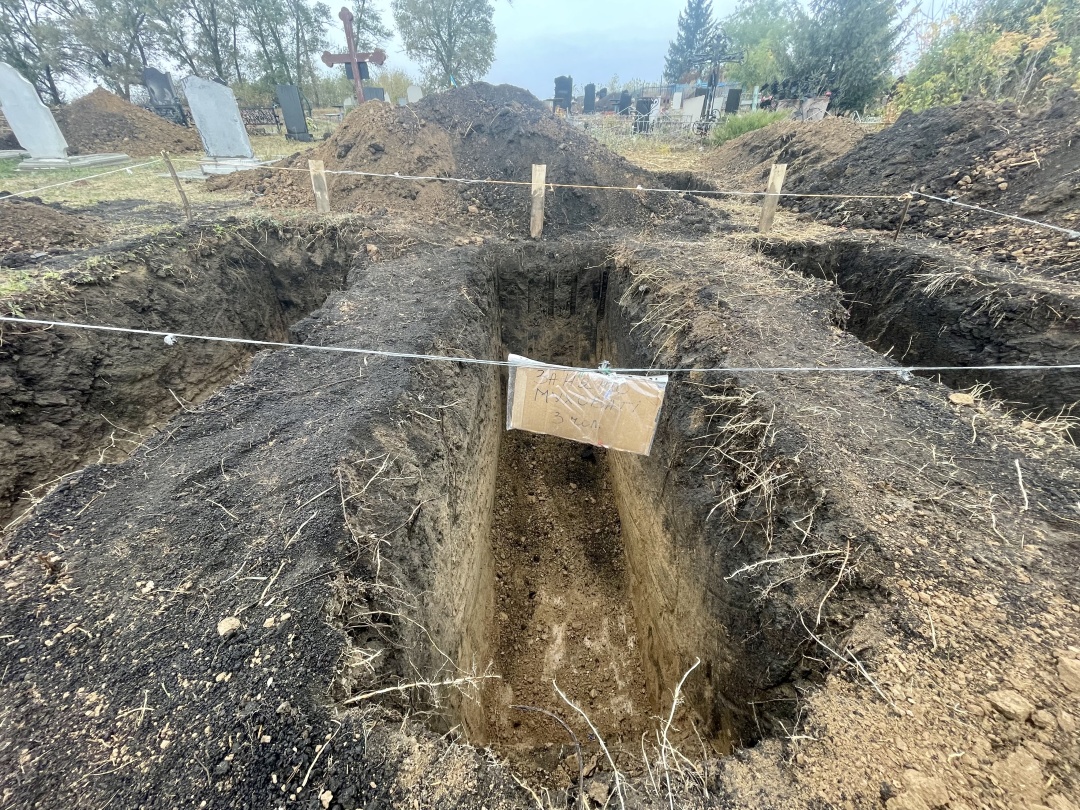
At least 23 new graves have been dug, and while we wait, you can hear the shovel thudding dully against the root – the workers continue to work, clearing space for new graves.
In total, 59 people were killed on 5 October by the Russian Iskander missile strike on the local cafe, where over 60 people gathered for the wake of Andriy Kozyr. The strike was so powerful that it was impossible to immediately identify all the bodies.
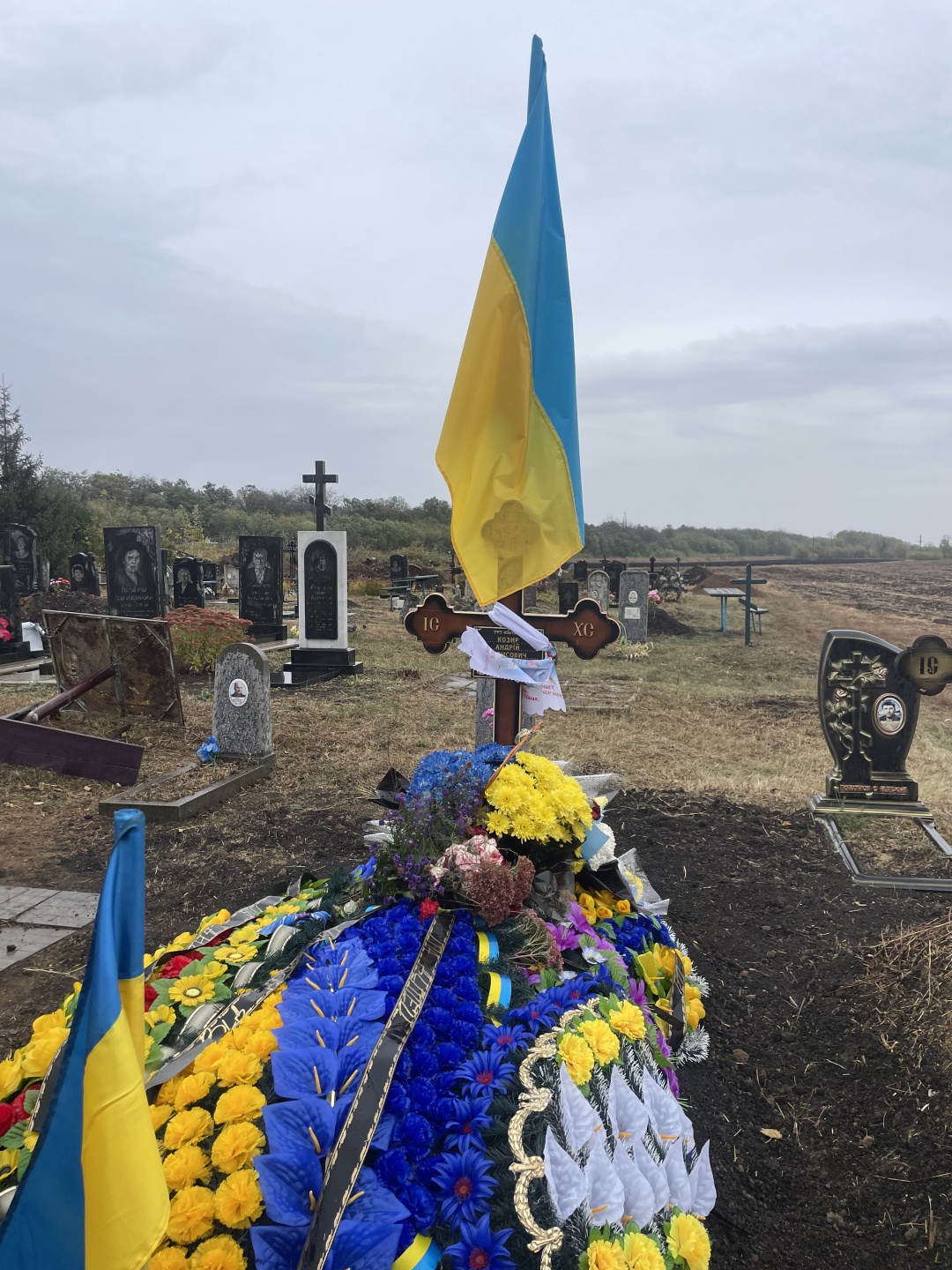
The atmosphere is very gloomy, the damp penetrates to the bones even of villagers used to working outdoors. Apart from fresh flowers, the only bright spot in the grayness descending on the village in the evening is the Ukrainian flag fluttering over the fresh grave of Andriy Kozyr.
One of the men in the cemetery is Mykola’s brother Petro, he is here with his wife Halia. Halia says that the children came to the funeral: daughter Kateryna from Slovakia, and son Dmytro from Kyiv. Halia and Petro did not go to the cafe for the wake that day because the family was working on the farm, and ran out of the house when they heard the terrible explosion.
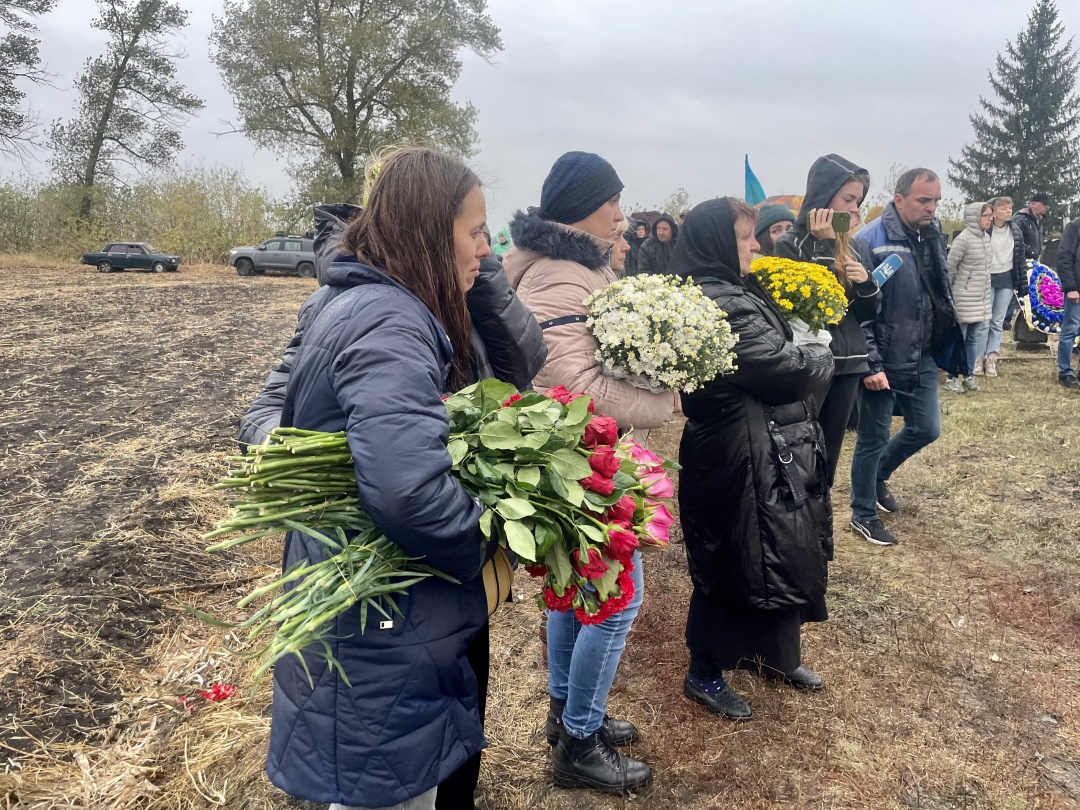
Around five o’clock, a white minivan funeral car arrives, through the open doors you can see two coffins draped in dark green. The men prepare the place for the funeral service. Daughter Kateryna holds large bundles of red roses and carnations: “I talked to my mother in the morning, she said I would come, find out all the news, and call back to share them… You see, she didn’t call back…”
The funeral service begins, mother Tetiana helps the local priest from Shevchenko – there is no church or school in Hroza itself. The destroyed cafe and shop next door were almost the only place around which village life revolved. Now everything will need to be “driven to the district,” that is, the neighboring Shevchenko.
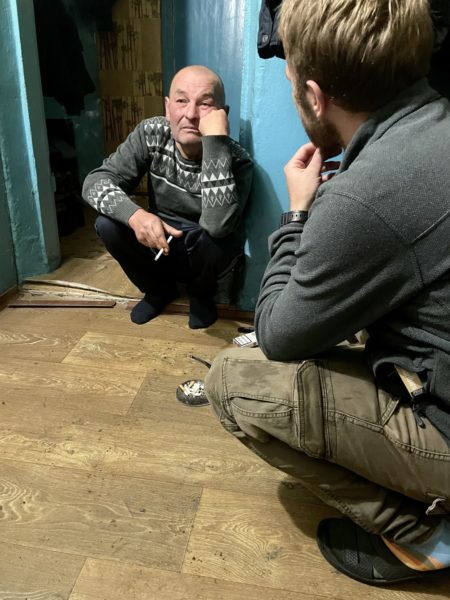
Around six o’clock, people start leaving. There will be no wake, because people are now afraid to gather in groups, and this is not the time anyway. We go home with Halyna and Petro. They live with their adult son Mykola in that part of the village that is across the dam. While the woman is busy in the kitchen, Petro smokes and recounts the details of that day: “Halia also said let’s go… We didn’t go and thank God for that.”
The family was actually saved by the cow. At the time when the gathering at the cafe was scheduled, they had just brought the cow home, it needed to be milked and taken to the garden, at that very moment the strike took place. At work in the “community services,” one of the guys told Petro that they should erect a monument to the cow – for saving their lives.
How Victor will live now that his wife has died, Petro does not know. We go with Halia across the street to the neighbor. Victor’s wife Zoia died, and he can’t milk himself. Halia skillfully milks two cows, collecting half a bucket of milk from each. Viktor says he won’t sell the livestock because “you have to live, this is my piece of bread” – and waves his hand towards the cow.
We return home – the family offered us a night’s lodging so we don’t have to drive back to the city after dark. For dinner – mashed potatoes, duck, and homemade preserves – everything from their farm. They only buy bread and sugar; everything else is helped by volunteers. They started coming to the village a year ago – on 7 September 2022, Hroza was liberated from the Russian occupation.
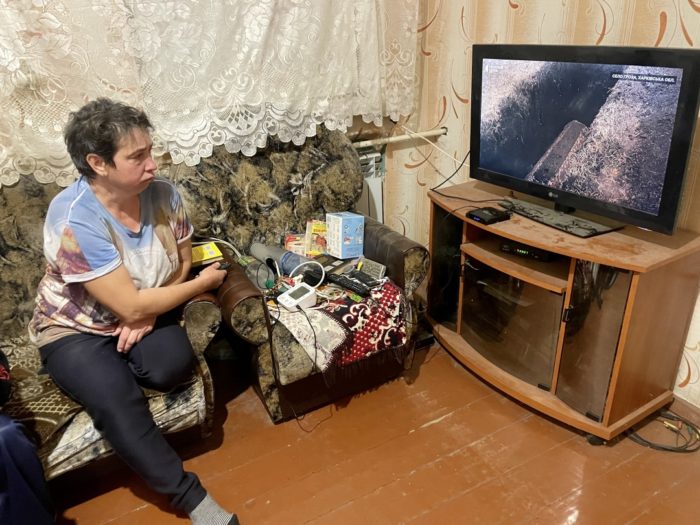
While we eat, we recall the slain Mykola, Tetyana, and all those whose lives were taken by the cafe strike. Halyna lists the families now grieving their losses; in particular she talks about the Kozyr family, where four children were left without parents. It is completely dark outside, street lights are no longer turned on and there is not a soul on the streets, only the sound of the continuing rain can be heard. From the kitchen we move to the living room, Halia turns on the TV, and everyone watches footage from today’s funeral. They recognize relatives, discuss the events of that day over and over again.
In the morning we go to the same cafe in the center of the village. In fact, it is one building, half of which was a store, the other half a cafe. Opposite is a children’s playground – that’s where they carried the bodies they could find under the rubble. Now it is a memorial site where people bring candles and flowers.
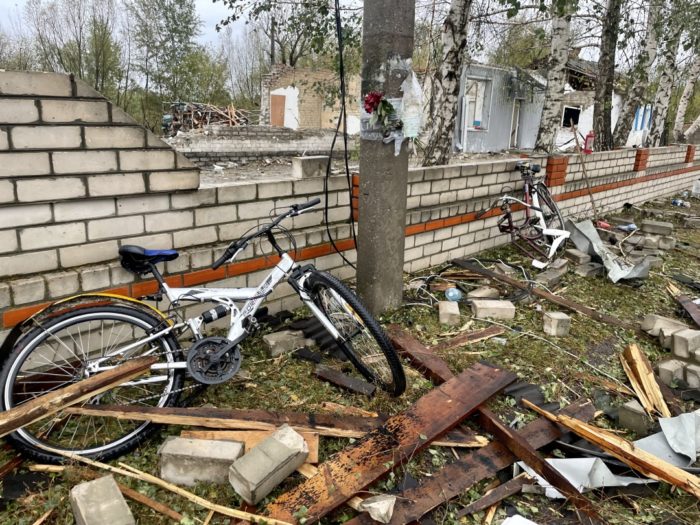
The building is completely shattered, only a few walls remain. You can see the crater from the missile at the site where the guests sat at the table. When rescuers and investigators worked there, they sifted through everything piece by piece to find body parts – now everything left of the buildings is piled up nearby. Two battered bicycles stand by the fence, probably no one is left to take them away.
We go into the yard opposite – Vasyl and Liubov live here. Liubov invites us into the house. It is clear that she wants to share her pain. She talks about the horror she saw on the day of the attack, about human body parts pulled from the rubble, about how many people died, and the family of Andriy Kozyr, almost all of whom were killed by the missile strike.
We ask about who could have given the Russians information about the place and time of the memorial event. After all, they struck at the exact time when people entered the cafe. Some were even still standing on the doorstep, now they are in Kharkiv hospitals with injuries.
Liubov says there were collaborators in the village who helped the occupation administration during the occupation. Someone even went to work in the police. She knows for sure because her son, a veteran of Ukraine’s 2014-2022 war against Russia’s proxy “republics” in Donbas, was held captive. She says she now hardly goes out on the street so as not to see those who were waiting for Russian occupation. She adds bitterly: “Maybe they won’t wait anymore now, who knows them…”
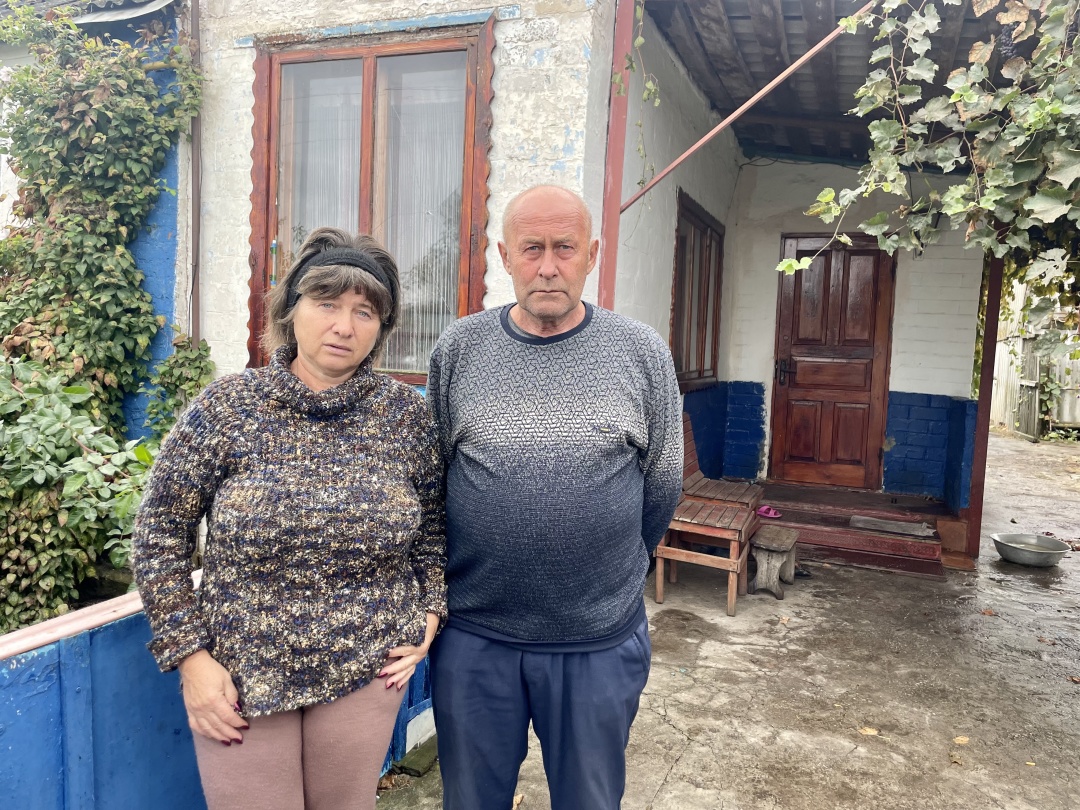
With a heavy heart we go to the Kozyr house – three minor children were left there without parents: Nastia, 10, Dima, 15, and Daryna, 17. We are met by their grandmother Liubov, soon their grandfather Valeriy comes home. Liuba shows photos and videos of her daughter Olichka, that’s what her husband and everyone in the village called her, photos of her grandchildren, video of the youngest Nastia baking pancakes, her mother Olia teaching her.
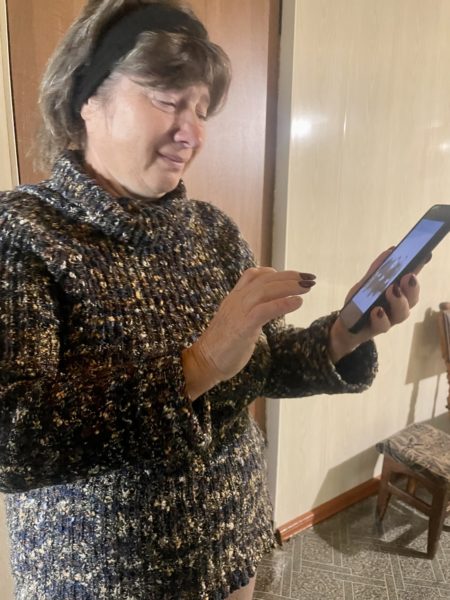
It’s hard for Lyuba to talk, she often cries, recalls the children, in-laws, her girlfriends, they all died that day. Her husband didn’t let her go to the cafe so she would remember the children as they were – beautiful and happy. Then he got on his bike, rode over there, came back 20 minutes later and said: “Liuba, our children are gone, I saw them.” Liuba says: “The [grandchildren] are hanging in there. However, little Nastia is fine during the day, but as evening comes – she asks for daddy and mommy.”
* * *
As a result of the missile strike on the village of Hroza in the Kharkiv Oblast, 6 children were left orphaned. Without parents were left: two small sons of Maksym and Alina Sirokurov; the elder son of Olha Pashchenko; three children of Olha and Anatoliy Panteleiev.
As a result of the strike on the cafe, 59 people were killed. Before the war, about 350 people lived in the village.
According to Ukraine’s Security Service, two local residents are suspected of targeting the cafe for the Russian missile – 30-year-old Volodymyr Mamon and his younger brother, 23-year-old Dmytro Mamon. During the occupation of the village, they went to work for the Russians and then fled to Russia. According to the intelligence service, since the beginning of October, the brothers began collecting information about preparations for the reburial of Andriy Kozyr and, having learned the exact address and time of the memorial service, passed this data to the Russians.
Originally published in Ukrainian on Ukrinform
Related:
- Funerals begin for victims of deadly Russian strike in Hroza
- UN field team to investigate deadly missile attack in Ukraine’s Hroza
- Ukrainian brothers accused of coordinating deadly Russian missile attack on a cafe in Hroza
- Russian attack on grocery kills 49 in Kharkiv Oblast (updated)
The post “Our children are gone”: Russian missile strike kills every sixth resident in village appeared first on Euromaidan Press.

